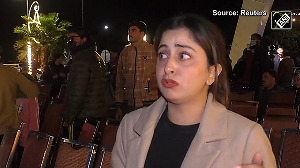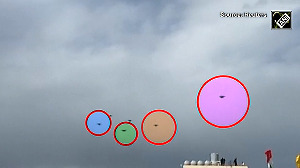I must confess to being continually amazed by Pakistan President General Pervez Musharraf -- and it does not stem from the ease with which he, with the straightest of straight faces, manages to tell such whoppers.
The real reason for my amazement is that his nose has remained the same size throughout -- you mean Pinocchio was a fable, after all?
Ever since he landed in the US for the 58th session of the United Nations General Assembly, Musharraf has been singing an old, familiar tune:
The violence in Kashmir is due to India's forceful occupation of that region; the bunch of brave fighting men who have at last count killed over 80,000 people, at least half of them defenceless women and children, in a little over a decade are not 'terrorists' but 'indigenous freedom fighters'.
I won't bring up the fact that the Pakistan president has, in his time, helped manufacture these 'indigenous' freedom fighters -- as in Kargil, when he dressed up units of the Pakistan Army in civilian attire and sent them across the border on a 'freedom struggle' that precipitated a war.
I won't bring up the fact that the Pakistan president, in that earlier avatar as head of that country's army, allowed the bodies of his own soldiers to go unclaimed for a long time -- because to claim them would have been to acknowledge his role in that 'indigenous freedom struggle'.
I won't mention these things; I won't even mention that Musharraf -- as per the evidence of a 'treasonous' interview former Pakistan prime minister Benazir Bhutto gave India Abroad, the Indian-American newspaper owned by rediff.com -- has spent most of his military life dreaming of a military victory -- by means more foul than fair -- over India and doing his damnedest to make that happen.
I won't mention these things, because such mentions make the president testy; they cause him to lose that famed smile, that bonhomie he is so well known for. The last time the subject was brought up in a public interview was last year this time, again while he was in New York for the UNGA. 'Forget the past!' he exhorted then. 'We cannot move forward if we keep looking back!'
He has a good turn of phrase, does the general. So, in deference to the general, leave the past alone, and look to the present.
'So long as India persists in its violent suppression of the Kashmiri people, they have a legitimate right to resist Indian occupation. Equating their freedom struggle with terrorism is a travesty.'
That is what Musharraf said -- on Monday, September 22. (He then said the same thing on Tuesday, September 23, Wednesday, September 24, and Thursday, September 25, at the UNGA plenary and various other forums. Some of his acolytes, in words that bore as much resemblance to diplomacy as I do to Jennifer Lopez, said the same thing at other forums.)
The statement was headlined in the online editions of The New York Times, The Washington Post and other major newspapers here.
On that same day, something else happened -- a fourth man pleaded guilty, in what is known in these parts as the Virginia jihad network.
Mohammad Aatique, it was reported, pleaded guilty to 'aiding and abetting several other defendants in preparing to fight India'.
For those who came in late -- and more especially, for Pakistan President General Musharraf, who evidently never came in at all on this one -- a quick recap:
On June 27, US Attorney Paul J McNulty unsealed in court an indictment against 11 men who were charged with violating the Neutrality Act, which bars US citizens and residents from attacking countries with which the United States is at peace -- in this case, India.
On that day, eight men were arrested for being part of a 'Virginia jihad network' with ties to the Pakistan-based -- note, not Kashmir-based -- terrorist group Lashkar-e-Tayiba.
McNulty, while reading out the indictment on that day, said the eight men who were produced in court that day, and three others who were in hiding in Saudi Arabia and were since arrested -- had plotted to engage in a jihad in Kashmir, Chechnya, the Philippines, and other countries.
McNulty spoke of connections between the Lashkar and Al Qaeda. He pointed out that the Lashkar had claimed responsibility for the December 2001 attack on India's Parliament, and had since been designated a terrorist outfit -- note, not 'freedom fighters' -- by the US, and banned.
While describing how the 11 indicted men purchased weapons and trained at firing ranges in Virginia and Pennsylvania, and also trained in military tactics at a paintball range in Spotsylvania County, Virginia, McNulty told the court that day that the Lashkar has been linked to the deaths of hundreds in Kashmir.
Earlier, in August, Donald Thomas Surratt, Yong Ki Kwon and Khwaja Mahmood Hasan pleaded guilty.
Aatique -- a Pakistani native, do note, not a Kashmiri -- became the fourth to enter a guilty plea to charges of helping alleged co-conspirators 'in preparing for and beginning a military expedition to be carried out from the United States against India'.
Aatique had been charged with, among other things, being a member of the banned Pakistan-based Lashkar-e-Tayiba that carries out terrorist operations in Kashmir. Lashkar had been declared a terrorist organisation, by the US state department, in 2001.
Prosecutors charged that Aatique hosted several alleged co-conspirators in his Pennsylvania house in the aftermath of 9/11, and that shortly thereafter, he travelled to Pakistan to attend a Lashkar training camp.
The official indictment, returned by the grand jury, states: 'The purposes of the conspiracy were to prepare for and engage in violent jihad on behalf of Muslims in Kashmir, Chechnya, the Philippines and other countries and territories...'
The 37 page indictment, which lists in detail various movements of the 11 accused, says inter alia:
- 'In or about July 2001, Mohammad Aatique told (fellow accused) Randall Todd Royer that Mohammad Aatique wanted to serve with the Lashkar-e-Tayiba in Pakistan.'
- 'In or about July 2001, Mohammad Aatique travelled from Pennsylvania to Virginia, so that Randall Todd Royer could provide him assistance in gaining admission to the Lashkar-e-Tayiba in Pakistan.'
- 'In or about July 2001, Randall Todd Royer telephoned Lashkar-e-Tayiba in Pakistan regarding Mohammad Aatique's desire to serve with Lashkar-e-Tayiba in Pakistan.'
- 'In or about late September 2001, Mohammad Aatique travelled to a Lashkar-e-Tayiba camp near Muzaffarabad, Pakistan.'
The indictment goes on -- and on -- to detail the training the men received -- in a Lashkar camp in Pakistan, in October 2001.
Does anything strike you as significant about that date? The 11 conspirators were training in a terrorist camp in Pakistan in October of 2001 -- fully a month after the terrorist strikes in the US of 9/11 and the declaration of the war on terror.
The indictment talks of how the adviser to this group informed the 11 that the US was not a good place to be in, post-9/11, and advised them to travel to Pakistan. Which they did. Pakistan and its president Pervez Musharraf, you have to remember, were -- and still are -- frontline allies of the US in the war on terror; that, of course, explains why terrorists believe it is a safe haven.
The entire indictment -- which details the links the 11 indicted conspirators had with terrorist agencies and camps in Pakistan, is worth a read.
India, says Musharraf, has created the 'fiction' of cross-border terrorism; presumably, the 80+ thousand graves dotting the Kashmir valley, and the bodies contained therein, are studio props to dress up that fiction.
But this is not an Indian 'fiction' -- this comes from the official indictment in a US court of law; four of those indicted have actually pleaded guilty to the acts they have been accused of.
It is actually India, a Musharraf acolyte said, that is sponsoring terrorism; India that has training camps in Kashmir and Rajasthan and is responsible for terrorism in Afghanistan and Sri Lanka and, hold your breath, Pakistan.
Worth a read, in this context, is an article in Time magazine's online edition titled Is Pakistan a friend or foe? It is dated September 21 -- that is, just around the time Musharraf was doing his Pinocchio number.
One extended quote:
'These same countervailing forces are at play in Islamabad's relations with militants fighting to expel India from the part of Muslim-majority Kashmir that it occupies. The militants' cause is popular within the Pakistani security forces and among Pakistanis in general. After India and Pakistan, both nuclear armed, nearly went to war over the conflict in May 2002, Musharraf assured Bush that there were no militant training camps in Pakistani territory.
'Deputy Secretary of State Richard Armitage reminded Musharraf of that guarantee when the two met in the northern city of Rawalpindi before Musharraf's last meeting with Bush in June. Armitage then produced a dossier of satellite photos showing camps of that nature. "Musharraf acted outraged and upset," a State Department official tells TIME, but it wasn't clear to the Americans whether he was angry that the camps were functioning or that the US had uncovered them.'
Uh oh.
Here's more, from the same article (emphasis ours):
'Musharraf has failed to sustain his promise to crack down on extremist groups that in the past fed fighters to the Kashmir cause, carried out sectarian killings and attacked Westerners. In January 2002, at the insistence of the US, Musharraf banned five such groups. Yet the government has allowed them to resurface under new names. Abdul Rauf Azhar, formerly of Jaish-e-Muhammad, says, "We are still doing our work."
'Azhar is not just any militant. Indian police suspect him of organizing the 1999 hijacking of an Indian Airlines flight to secure the release of his brother Maulana Masood Azhar, among other prisoners, from an Indian jail. The two Azhar brothers top India's wanted-terrorist list, but Pakistan brought no charges against Abdul Rauf. Musharraf did vow to keep Masood under house arrest, but staff members at his ornate mansion in Bahawalpur say he is free to travel, give incendiary sermons against the US and collect donations for the Kashmiri insurgency.'
So, how did that line go? 'Indigenous freedom fighters'? 'To equate them with terrorists is a travesty'?
The dictionary defines 'indigenous' as: Native; produced, growing, or living, naturally in a country or climate; not exotic; not imported.
In context, those 'freedom fighters' who kill new-born babies are -- or so claims Pakistan's president -- sons of the Kashmir soil. Not Pakistanis trained in terrorist camps on Pakistan soil.
Which is why I said at the outset that I was surprised his nose hadn't grown.
I keep thinking of President General Pervez Musharraf in terms of fictional characters. Remember Humpty Dumpty, in Alice Through the Looking Glass?
'When I say a word, it means exactly what I want it to mean.'
Keep Humpty Dumpty in mind, the next time you hear Musharraf speak. The words he says don't mean what the dictionary says it means, or what you think it means; they mean merely what Musharraf wants them to mean.
As in: 'Indigenous' -- 'produced at home by me.'
PS: You know what pisses me off, though -- and in fact prompted me to write this? Next to the New York offices of India Abroad where I work is a deli. Sometimes, when the weather is good, people sit in the chairs outside it, drinking coffee, sharing a smoke, and shooting the breeze.
The weather was good this Wednesday. So we were sitting there and chatting -- me, and one black and one white guy, both of whom work in an office a few floors above mine. The assembly of world leaders at the UN was the obvious subject of the day, not least because US President George W Bush was addressing that body the same morning.
So what, asks one of my friends, inter alia, is with this whole Kashmir thing? I explain to him, very briefly, what the problem there is. And then he goes, 'But whose land is it anyway?' I tell him it is ours. India's. But that Pakistan president says India has occupied it by force, he says, and your guys don't deny it.
That is when it occurred to me. Last Saturday, an Indian delegation landed here -- Prime Minister Atal Bihari Vajpayee, Foreign Minister Yashwant Sinha, National Security Adviser Brajesh Mishra, Foreign Secretary Kanwal Sibal and a host of others.
Musharraf landed two days later -- and managed, between then and now, to give interviews to every major television station and newspaper that would have him; simultaneously, others in his group fanned out to spread the message elsewhere.
But not a yip out of the Indian delegation, by way of substantive refutation based on facts and figures. Not even a rebuttal of that absurd charge that India has 'forcefully occupied' Kashmir. And how does one explain that, to people here like my two friends?
Managing Editor Prem Panicker now works out of New York.






 © 2025
© 2025